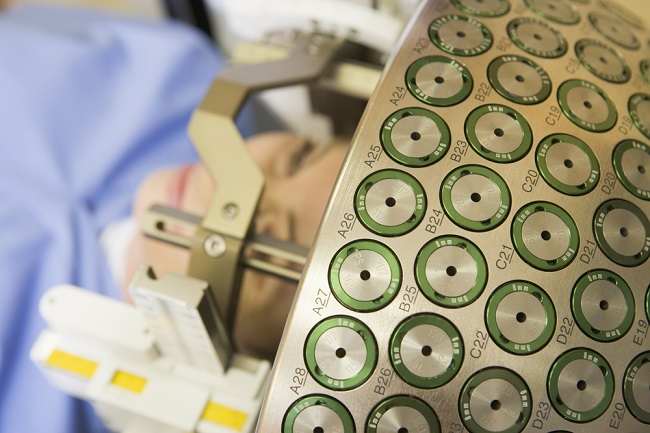Nicotine addiction is a condition when a person is addicted to nicotinewhich generally found in tobacco products, such as cigarettes.Psuffer from nicotine addiction difficult escape from dependency, though he realized that it can pose a health hazardhis.
Nicotine causes a temporary pleasure effect in the brain, which makes a person dependent on this substance. People who are addicted will usually feel anxious and irritable when they do not get nicotine intake.

Cigarettes are products known to contain nicotine. Cigarettes contain many toxic substances that can make smokers more at risk of heart attacks, strokes, and cancer.
Causes of Nicotine Addiction
Nicotine addiction is generally caused by smoking or consuming other tobacco products, such as chewing gum containing tobacco and shisha. Individuals who don't smoke very often can also become addicted to nicotine, due to the highly addictive nature of nicotine. This is one of the reasons why smokers find it difficult to quit smoking.
Every time someone smokes, nicotine will be absorbed by the blood and then flow to the brain. Generally, smokers absorb 1–1.5 mg of nicotine from one cigarette. Once in the brain, nicotine will increase the release of dopamine, a chemical that helps improve mood and create a sense of satisfaction.
Anyone who smokes or uses other products that contain nicotine has the potential to become addicted. However, the following factors can increase a person's risk of developing nicotine addiction:
- Age
The younger a person is when they start smoking, the more likely they are to become a heavy smoker as an adult.
- Genetics
Genetic factors can influence brain receptors to respond to high doses of nicotine.
- Depression
Many studies have shown that there is a link between smoking and mental disorders, such as depression, schizophrenia, or PTSD.
- Environment
Children who grow up in a smoking environment tend to become smokers.
- Drug abuse
People who are addicted to alcohol and drug dependence are also more likely to smoke.
Symptoms of Nicotine Addiction
The following symptoms can be signs that someone is addicted to nicotine:
- Can't stop smokingPatients do not succeed even though they often try to quit smoking.
- Keep smoking while suffer disease
Patients continue to smoke even though they have lung or heart problems and know that smoking can worsen their condition.
- Avoid smoking environmentPatients avoid visiting places that are not allowed to smoke, or stop hanging out with certain people that make them unable to smoke.
When the amount of nicotine in the body decreases, for example, because the patient cannot smoke because he is in a non-smoking room, people with nicotine addiction will usually experience several physical and mental symptoms, such as:
- Anxiety
- Diarrhea
- Nervous
- Depression
- Frustration
- Insomnia
- Constipation
- Easy to get angry
- Difficult to concentrate
When to go to the doctor
Many smokers often fail when trying to break away from their addiction to nicotine. Therefore, consult your doctor if you are addicted to nicotine and would like assistance in making an appropriate plan for dealing with it.
Undergoing a program to treat nicotine addiction, which includes both physical and behavioral aspects, as well as taking medication from your doctor will increase your chances of recovery.
Diagnosis of Nicotine Addiction
Nicotine addiction is also known as a tobacco use disorder. To diagnose nicotine addiction, the doctor will ask the patient about his habit of using products containing nicotine, as well as about the patient's medical history.
Then, the doctor will perform a thorough physical examination, which includes checking body temperature, heart rate, blood pressure, as well as breath sounds and heart sounds.
A person is declared addicted to nicotine if in the last 12 months experiencing or having at least 2 of the 11 criteria below:
- Smoking large amounts or long periods of time
- Tried to quit smoking, but failed
- It takes a long time to do something because it is done while smoking
- Have an urgent urge to smoke immediately
- Smoking repeatedly to cause failure in completing work
- Continue to smoke even though repeatedly causes problems with the social environment, for example arguing with other people because of smoking problems
- Reduce social interaction if the activity prevents him from smoking
- Keep smoking even in an environment where danger may arise, for example in bed
- Don't stop smoking even though you know the dangers and feel the bad effects of smoking
- The desire to continue smoking until it reaches the desired effect
- Experiencing withdrawal syndrome, which is a symptom that occurs when someone who is used to smoking starts to quit smoking, or starts smoking again to avoid withdrawal syndrome symptoms
Nicotine Addiction Treatment
Treatment for people with nicotine addiction can be done with or without drugs. Having a strong desire, motivation, commitment, and consistency in taking medication are the most important aspects of overcoming nicotine addiction.
Nicotine addiction in the form of cigarettes can be overcome by stopping smoking habits. This can be done in 3 ways, namely:
- Stop for a moment
Patients stop smoking right away without reducing smoking gradually. For heavy smokers, this method requires medical assistance to overcome the effects of addiction.
- Postpone
Patients delay smoking the first cigarette 2 hours every day. For example, if the patient is used to smoking the first cigarette at 7 am, then the next day he starts smoking at 9 am, then the day after tomorrow he starts smoking at 11 pm. In this way, smoking cessation can be planned in 7 days.
- Reduce
Patients gradually reduce the number of cigarettes smoked each day. If the patient usually smokes 24 cigarettes a day, reduce 2-4 cigarettes per day.
About 90% of people with nicotine addiction try to quit their addiction without the help of drugs or therapy. However, this method is considered less effective, because only 5–7% of patients can actually stop.
Therefore, some of the methods below may be needed to increase success in quitting smoking and overcoming nicotine addiction:
1. Counseling
In counseling, the doctor will assess the patient's addiction history, level of addiction, and the patient's health condition. Based on this assessment, the doctor will provide appropriate advice and assistance to the patient, so that the patient is more motivated to quit smoking.
If needed, the doctor will also refer the patient for group counseling with other sufferers or follow behavioral therapy.
The role of counseling for nicotine addiction patients is to motivate patients to change their habits. The doctor will help the patient make a plan to quit smoking and give advice on how to avoid situations that make the patient want to smoke.
Not only that, patients will also be assisted in overcoming mental problems that arise due to quitting smoking.
2. Behavioral Therapy
In behavioral therapy, the doctor will help the patient find the factors that cause the patient to smoke, and develop a plan to avoid these factors and deal with withdrawal symptoms.
There are 5 phases of behavior change from a smoker, namely:
- Pre-contemplation phase
In this phase, the patient does not intend to quit so he should be directed to stop smoking. The patient will be explained the disadvantages of smoking and the advantages of quitting smoking so that the patient has the intention to quit.
- Contemplation phase
In the contemplation phase, the doctor will encourage the patient's belief that smoking cessation can be done and will help the patient to start smoking.
- Preparation phase
In the preparation phase, the patient is ready to quit smoking. Doctors will help patients identify barriers to doing so and provide solutions.
- Action phase
At this stage, the patient had stopped smoking for up to 6 months. The doctor will help the patient to stay consistent and prevent the urge to smoke from coming back.
- Maintenance phase
The patient has stopped smoking for more than 6 months and is used to not smoking in his daily life. Doctors will help the patient to stop smoking and are ready to help if the patient needs support.
3. Tnicotine replacement therapy (nicotine replacement therapy)
In this therapy, doctors can give plasters, chewing gum, sprays or lozenges that contain small amounts of nicotine, so that the patient's body is slowly released from nicotine addiction.
4. Medicines
Drugs commonly used to stop nicotine addiction are bupropion and varenicline. Both drugs mimic the effects of nicotine on the body and prevent withdrawal symptoms from occurring.
In addition to undergoing the above therapy, patients can also do the following things to help the healing process:
- Exercise regularly
- Choose healthy food to eat
- Throw away all cigarettes owned
- Set a target to quit and a reward if you reach that target
- Avoid situations that can make the patient smoke again, for example being around smokers
Several other therapies, such as hypnosis, acupuncture, and the consumption of herbal medicines, should be consulted with a doctor before undergoing them.
Complications of Nicotine Addiction
Cigarettes damage almost every organ of your body and your immune system. This is because cigarettes contain more than 60 cancer-causing chemicals and thousands of other harmful substances.
The following are just some of the complications that can occur in individuals who are addicted to smoking:
- Respiratory tract diseaseSmokers are more prone to respiratory infections, such as colds, flu, and bronchitis.
- Decreased immune systemCigarettes can weaken the immune system, so smokers are more susceptible to disease, including diseases that attack the immune system.
- Diabetes
Smoking can increase a person's risk of developing type 2 diabetes and accelerate the occurrence of diabetes complications, such as kidney failure.
- Eye problems
Cataracts or vision loss due to macular degeneration are more at risk for smokers.
- Heart and blood vessel disease
Smoking increases a person's risk of having a heart attack, heart failure, and stroke.
- Lung cancer and other lung diseases
Nine out of ten cases of lung cancer are caused by smoking. Smoking also causes chronic obstructive pulmonary disease and worsens asthma.
- Different types of cancer
Cigarettes are the main cause of oral and esophageal cancer, laryngeal cancer, pharyngeal cancer, bladder cancer, pancreatic cancer, kidney cancer, cervical cancer, and blood cancer. Overall, smoking causes 30% of all cancer deaths.
- Infertilityand impotence
Smoking increases the risk of infertility in women and erectile dysfunction in men.
- Complications of pregnancy and birth
Pregnant women who smoke are at increased risk of miscarriage, premature delivery, having a low birth weight baby, and sudden infant death.
- Deteriorating physical appearance
Chemical toxins in cigarettes can make skin look aged and teeth yellow.
- Risk to those closest to you
People who don't smoke but live close to smokers are more at risk of developing lung cancer and heart disease than people who don't smoke.
Nicotine Addiction Prevention
The best way to prevent nicotine addiction is to avoid nicotine use in the first place. Never try nicotine in any form or in any amount.
Prevention of nicotine use should be done since adolescence, because this age group is most susceptible to being influenced to use nicotine, especially in the form of cigarettes.
Some of the ways below can also be done together to prevent the use of nicotine which can cause addiction:
- Restricting access to cigarettes for minors
- Restrict smoking access in public spaces
- Limiting advertising of cigarette products
- Increase the price of cigarettes by increasing the tax
- Raise awareness of the dangers of smoking to health









